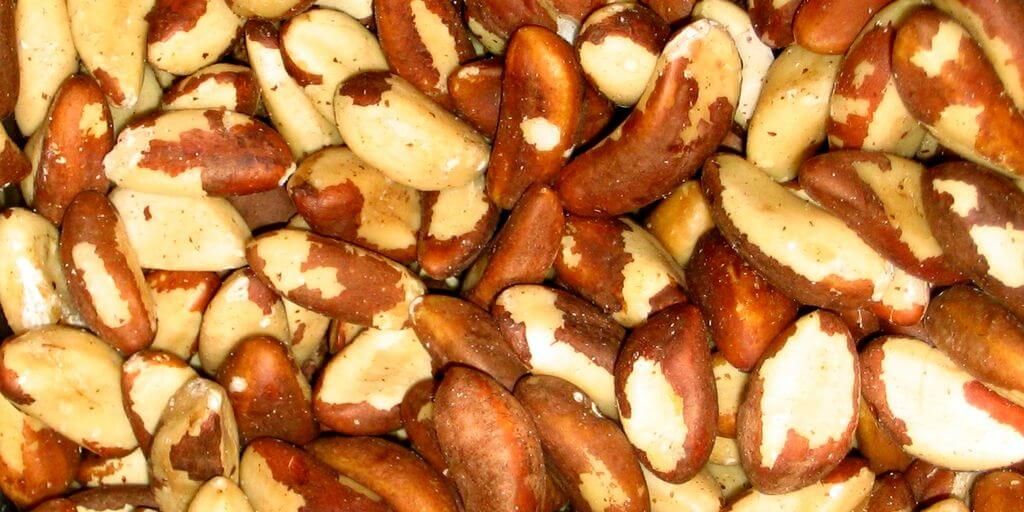The Brazil nut is the edible seed of a large South American tree (Bertholletia excelsa) found in the Amazonian forests of Brazil. The nut is cherished by the indigenous people of this region for its much-needed protein, fats and other essential nutrients.
Contrary to popular belief, Brazil nuts are found in many areas other than Brazil, including: Bolivia, Columbia, Ecuador, Peru, Venezuela and the Guiana’s. In fact, it is Bolivia, not Brazil, who is the largest producer of Brazil nuts.
Brazil Nut Tree Habitat
Almost exclusively, Brazil nut trees can be found in abundance in non-flooded forest regions of South America. This stately tree is one of the largest trees in the Amazon rainforest, growing up to 50 meters tall and living anywhere from 500 to 700 years.
Each mature tree forms fruit pods, a large shelled fruit, which falls from the trees with a thunderous crash. Each fruit pod contains 12 to 25 Brazil nuts, which is the part of the tree that people use for a variety of health and culinary purposes.
Health Benefits of Brazil Nuts
Although Brazil nuts are high in calories, they contain ample amounts of vitamins, antioxidants and minerals. The nuts are a vital part of the staple diets of Amazonian people.
Good Fats in Brazil Nuts
100 grams of Brazil nuts yield approximately 656 calories. The reason why they contain so many calories is because of their high concentration of fats.
A Brazil nut consists of 70 percent fat and 17 percent protein. However, most of these fats are “good fats” like mono-unsaturated fatty acids such as palmitoleic acid and oleic acid. These types of fats help to lower “bad cholesterol” and increase “good cholesterol” in your body. Research studies show that diets rich in palmitoleic acid and oleic acid help to prevent coronary artery disease and strokes.
Vitamin E in Brazil Nuts
Brazil nuts have also been found to contain high amounts of vitamin-E. On average, 100 grams of these nuts contains a whopping 52 percent of the recommended daily value of Vitamin E. Vitamin E is a powerful antioxidant that is required for maintaining the integrity of cell membranes, mucus membranes and your skin.
Selenium in Brazil Nuts
Ounce for ounce, Brazil nuts contain the highest levels of Selenium found naturally in any plant, fruit or nut. Only one ounce of Brazil nuts contains over seven times the daily recommended value of selenium.
An individual can obtain all of the selenium they need for the day by consuming just one or two nut. Adequate selenium intake has numerous health benefits. including preventing coronary artery disease, liver cirrhosis, and many forms of cancer.
Brazil Nuts are Gluten Free
Brazil nuts are gluten-free and provide a healthy alternative for people with wheat allergies and Celiac disease.
B Vitamins in Brazil Nuts
Additionally, these creamy nuts are an excellent source of B vitamins, and 100 grams of Brazil nuts contain over half of the daily recommended value of thiamin. They also contain a host of energy-giving B vitamins such as riboflavin, niacin, pantothenic acid, pyridoxine and folate.
Minerals in Brazil Nuts
Brazil nuts have high levels of many other beneficial constituents other than selenium, including magnesium, copper, calcium, manganese, phosphorus, potassium, iron and zinc.
A one ounce serving of Brazil nuts contain 27 % of the recommended daily value of magnesium, which assists with muscle performance, the production of protein and absorption of energy from food.
They provide a healthy dose of copper too. A one ounce serving contains 25 percent of the recommended daily value for copper. Copper helps the body in many ways, including facilitating iron absorption and maintaining bone and connective tissue health.
Brazil nuts do a wonderful job of supporting bone and teeth health because the same one ounce portion also contains 20 % of the recommended daily value of phosphorus.
Amino Acids in Brazil Nuts
Brazil nut oil contains many helpful amino acids, namely; linoleic, oleic, palmitic and alpha linolenic acids. The proteins found in Brazil nuts are an excellent source of other amino acids such as; cysteine and methionine.
These nuts also contain high concentrations of; glutamine, glutamic acid, and arginine. These amino acids work to facilitate selenium absorption and assists the digestive absorption of other minerals in the nut.
How to Take Brazil Nuts
The Brazil nut is usually consumed fresh or roasted, as a nut. It can also be consumed as an oil (Brazil nut oil).
Shopping
| Visit the new SHOPPING page for a wide selection of amazing products! |
Always take care when taking herbs and Read Our Disclaimer.
Brazil Nuts Notes / Side Effects
Latin Name
Bertholletia excelsa
Common Names
In the local region where it is found, some of the common names for this nut are:
castania, castanha-do-pará, para-nut, Castaña-de-Brazil and cream-nut.
Potential Side Effects of Brazil Nuts
Brazil nuts are a nutrient-dense food, but consuming them in excess or under certain conditions can cause side effects. Here are some potential side effects:
Selenium Toxicity: Brazil nuts are extremely high in selenium. Overconsumption can lead to selenium toxicity, also known as selenosis, causing symptoms like hair loss, nail brittleness, nausea, and even nervous system issues. (Source: NIH)
Allergic Reactions: Individuals allergic to tree nuts may experience reactions, including itching, swelling, hives, or anaphylaxis in severe cases. (Source: American Academy of Allergy, Asthma & Immunology)
Weight Gain: Brazil nuts are calorie-dense, so eating too many can contribute to weight gain if not balanced within an overall diet. (Source: Healthline)
Radiation Exposure: Brazil nuts naturally contain small amounts of radium due to their deep-rooted trees. The levels are generally harmless but could be a concern in excessive consumption. (Source: Environmental Protection Agency)
Digestive Discomfort: High-fat content may cause gastrointestinal issues like diarrhea if eaten in large quantities. (Source: Cleveland Clinic)
Safe Consumption: Stick to 1-3 Brazil nuts per day, which provides adequate selenium without exceeding the recommended daily limit.
Consult a healthcare provider if you have underlying conditions or concerns about nut allergies.



Leave a Reply